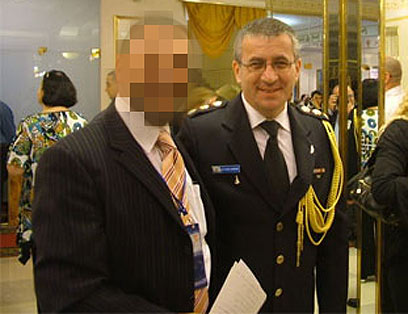
An Israeli miltary attache to Moscow who was expelled from the country was carrying secret information when he was detained, Russia's Foreign Ministry said on Thursday.
Vadim Leiderman was apprehended in Moscow on May 12, caught red-handed receiving classified information from a Russian citizen, the statement said. Leiderman was declared persona non grata and given 48 hours to leave the country, which he did, the statement said.
Israel has rejected allegations reported in the Israeli media that Leiderman was a spy. The case was cleared for publication Wednesday.
Military Attaché Colonel Vadim Leiderman was arrested at a coffee shop in Moscow, where he was meeting with a Russian army officer. He was then interrogated by one of Russia's intelligence agencies, apparently the FSB. He and his family were given 48 hours to leave the country.
Leiderman has since been questioned by Israeli security officials. He maintains that the allegations are baseless and false, and that the entire incident stems from a misunderstanding.
The attaché was interrogated by the Shin Bet and the Defense Ministry, both of which investigated the case for four days, and was even submitted to a lie detector test before it was announced that Russia's allegations had been found to be untrue.
Officials say the government has never received any secret information from Leiderman.
The attache's function does not include any type of espionage. He serves as liaison with the Russian military and military industries, and follows publications by the Kremlin. But governments all over the world tend to keep military attachés under close scrutiny.
Israeli officials were shocked by Leiderman's arrest. The state's relations with Russia have not been tense despite its various arms dealings with Syria, and just a few days ago former IDF Chief of Staff Shaul Mofaz led an official visit to Moscow, attended by members of the Knesset Foreign Affairs and Defense Committee.

Leiderman. Cites misunderstanding (Photo: Ahiya Raved)
'Defense industries expressing anger'
Yaakov Kedmi, who was the head of Nativ, a covert organization that maintained ties with Jews living in the former Soviet Union, speculated as to why Leiderman was expelled, and why now.
Kedmi says local military industries may have demanded the move in order to express their ire with Israel, which has pressed the country in various ways to cease all weapons sales to hostile Arab countries that threaten the Jewish state.
Kedmi, who is a specialist in Israeli-Russian relations, also has another theory; the diplomatic expulsion was a product of competition between two intelligence agencies – the GRU, which supervises the military, and the FSB, which supervises civilians and diplomats.
The two agencies are in constant competition over resources. When the GRU found out a Russian officer was meeting with Leiderman it may have prompted the agency to act on a whim, without confirming its suspicions, in order to prove its efficiency. The FSB would then have had to go along with the arrest. This would also serve as a warning to Russian officers against meeting with diplomats without first receiving permission.
A similar occurrence took place in 1996, when Russia expelled Mossad ambassador Reuven Dinal from its land. He was arrested while trying to purchase satellite photos from a GRU officer and interrogated violently by the FSB, and was then declared persona non-grata. Israel said at the time that he was purchasing the photos from a company that sells them online.
Jerusalem currently believes the incident will blow over. Sources say that had the Russians truly believed Leiderman was spying, they would have kept him in the country in order to try him in court.
Meanwhile, the Foreign Ministry is keeping up appearances of business as usual and on Wednesday even hosted a Russian delegation for a discussion on the unlikely subject of cyber-espionage.
Russia's RIA Novosti news agency quoted a Moscow security source as saying Leiderman's case was suspected of industrial espionage.
"Leiderman's case could not be about anything but industrial espionage," the reports said, further adding that "The active assistance he offered several Israeli firms in the Russian market was the problem."
Ronen Medzini and Attila Somfalvi contributed to this report
- Follow Ynetnews on Facebook















